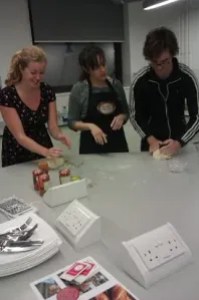By Chris Park, Features Editor
Two Italian chefs are yelling at each other from across the kitchen. They’re speaking Italian so we sit there blankly looking at each other with the same bemused look. I can already tell it’s going to be an exciting class: the “Italian Mamas” Paola Pasino and Cristina Ciucci are vibrant Italian women and they are passionate about cooking; but they’re on a mission.
They want to get students cooking healthy, low cost meals because we all know the student diet consists of boiling water for pot noodles, not pasta; waiting in line at the chippie, not waiting for the vegetables to be ready. The classes were free of charge and were sponsored by Sacla: a food manufacturer specialising in Italian sauces and pesto. At the class I joined, the chefs were cooking pasta, pizza and chicken casserole. The recipes have been tailor-made to suit the cooking skills and budgets of students.

Paola then moves on the chicken casserole while the water for the pasta is boiling. She’s going through the recipe step by step and explaining how it’s done and why; we’re given great insight into the method and preparation and Paola encourages us to ask questions throughout. For example she advises removing the skin from chicken as a way to cut out fat and wrapping it in bacon (although this does add fat) will help the chicken keep its moisture. Paola stresses the importance of being careful with raw meat because it has a lot of germs. Use different chopping boards and knives and clean work surfaces thoroughly to prevent cross contamination of bacteria. She points out indignantly that Jamie Oliver never washes his vegetables: “I always shout at the telly “no you’ve got to wash them first””.
Paola constantly reminds us that the virtue of the recipes is how adaptable they are: you can add or remove vegetables to your taste and experiment with herbs, spices and sauces. I ask Paola what message she would give to encourage reluctant students to start cooking: “I think they should try. When you do you’ll realise that it’s not difficult, it can be fun, it’s creative, you can do it with your friends and you can save money. Being able to cook will always impress your parents and your girlfriend or boyfriend.”
Paola is starting to make the pizza now and there’s nervous laughter when she tells us that we’re going to help with the dough. We all approach the counter slowly, cautiously, as if the kitchen was an alien place to us – we students have no idea what to do when it’s our turn to be head chef. Paola tells us to be aggressive with the dough and to use our palms not our fingers to stop it sticking. She made it look so easy. I ask Paola why she thinks students have such poor cooking skills: “Maybe they’re used to having their parents do everything for them, then when they have to survive on their own and they’re learning at Uni they don’t always have the time to cook so it’s more convenient to get something that’s ready-made.”
The water for the pasta is bubbling away and Paola tells us that no one ever teaches how to cook a simple pasta dish. It requires a lot of water and we were all surprised by the amount of salt Paola used, but she insists it’s for flavour; indeed, when we tried it later on the salt added flavour to the pasta that I had never tasted before. Testing to see when the pasta is ready is a tasting and viewing process: bite into a piece and if it is white around the edge then it needs more time. To the amusement of the others, I suggested she should throw it against the wall and if it sticks then it’s ready; however she told me I need to reassess how I work with pasta. I won’t argue with her, Paola grew up in Italy and has cooked all her life. Now, with Cristina, the cooking duo (Two Mamas) specialise in fresh bread and pasta making.
After making the pesto sauce, the pasta is ready in no time and with the pizza out of the oven we tuck in to a feast of homemade Italian specialties. The casserole will take slightly longer to ensure the chicken is thoroughly cooked, so while we wait I ask Paola to reflect on how the classes have gone. “The cooking classes have been very successful. I think we had nearly 30 attending this class and nearly 20 in the last class. I would have liked help with the promotion of the class but that didn’t happen. If more students were aware that it was happening then we could have had even more people; it’s only in the student’s interest because it was free, they had the opportunity to learn how to cook and they got a free dinner as well.” It was disappointing to hear that the Strathclyde Union wouldn’t promote the event without being paid for it; after all, there’s no money or effort involved in spreading the word on Twitter or Facebook.
Paola tells me that she would love to run a similar class in the future but for this to happen she needs sponsorship to help cover the costs from either a company or the university. From my experience at the cooking class I think it would be a terrible waste not to run more classes in the future. The life skills they can teach students are invaluable: how else will some students learn the basics of cooking healthy food when they are away from home; helping them budget, save money and stay healthy.
Paola and Cristina make up Two Mamas and you can view there blog at http://www.twomamas.com